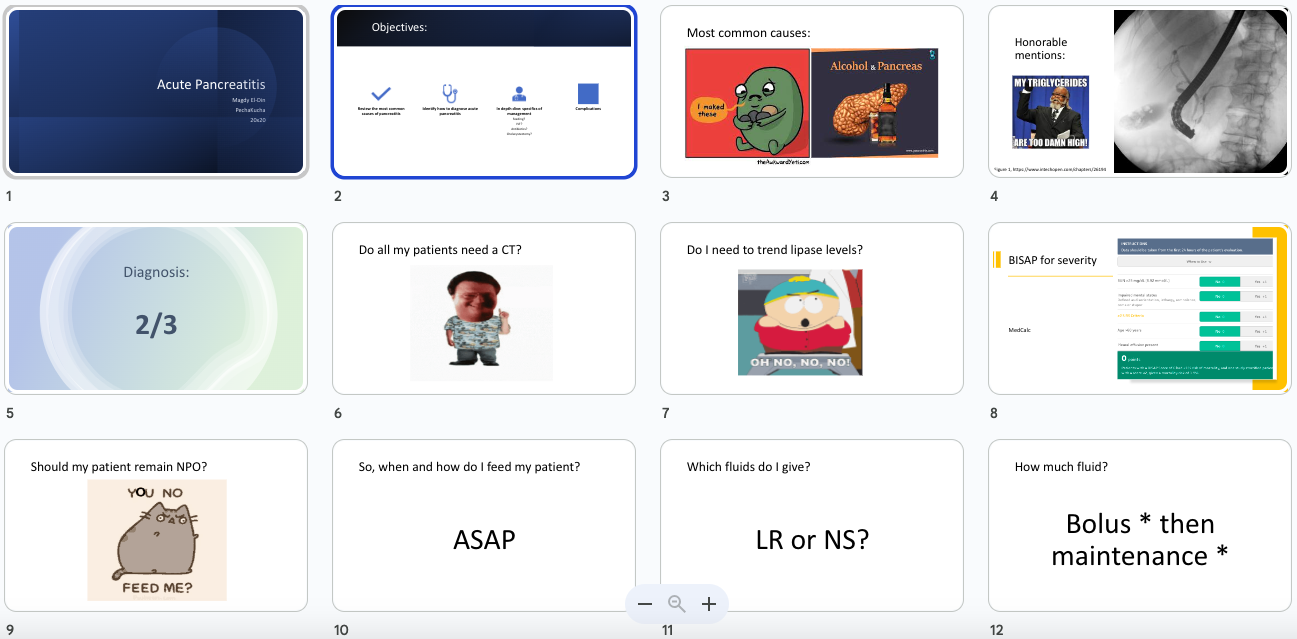Background: PechaKucha, Japanese for “chit chat”, is a presentation format with twenty slides auto advancing after twenty seconds each. The total presentation time is 6 minutes and 40 seconds. Slides rely on pictures and may be modified to include few words summarizing expansive topics. Feedback from our learners has been overall positive, with higher engagement and motivation to read beyond the presented material. This has allowed for the expansion of the pilot to other domains of our evolving didactics
Purpose: The aim of PechaKucha is to build a time efficient and structured approach to topics covered during intern bootcamp and commonly encountered by students during their inpatient rotations. With increasing clinical demands, time on wards for pedagogical instruction is ever dwindling. Using the PechaKucha framework, extensive topics can be summarized with a total presentation time of under seven minutes, thus promoting rehearsal and topic mastery prior to presentations. PechaKucha also aims to improve presentation skills by avoiding overpopulated slides (cognitive overload) or dragging presentations that go over allotted time, and circumvent underprepared presenters relying heavily on their slides.
Description: At our new Internal Medicine residency program, we used PechaKucha as an introduction to broad topics for intern bootcamp during the first two months of the intern year noon lecture series, with acute pancreatitis as our first model topic. Before a detailed discussion to follow, a prepared PowerPoint presentation with slides timed to advance every 20 seconds is used. We go through the most common causes of acute pancreatitis, discuss the diagnostic criteria to establish the diagnosis, provide answers to which IV fluid to use, discuss the WATERFALL trial and applicability to at risk populations for volume overload, then discuss the most common complications and management of the underlying cause, mentioning the PONCHO trial. Slides include very few words and images to solidify content to the audience. With the positive feedback and interest by the rotating medical students during the initial launch phase, we were able to implement PechaKucha style “capstone” presentations for our visiting students on one of our teams starting July 2023 at the end of their four weeks block. Presentations are prepared by the MS3 or MS4 on a topic encountered during their rotation, with the supervision of their senior resident. Presentations are discussed on the afternoon of the students’ final Friday in the presence of all other three inpatient team members to enrich the discussion and diversify feedback. Having learners actively engaged in preparation of PechaKucha style topic discussions immerses students and residents in Dale’s Cone of Experience. For it to be effective however, especially for junior learners, PechaKucha requires supervision by a mentor or senior resident for identification of important concepts and to ensure educational objectives are met
Conclusions: PechaKucha’s time constrained and focused format can help improve presentation skills, provide a standardized and time efficient framework to discuss “bread and butter” topics encountered on the general medical floors, and acts as a nucleus for more in-depth reading and discussion. Presenters and audiences alike find this style fun, interactive and challenging. An important concept solidified by PechaKucha in Undergraduate Medical Education and Graduate Medical Education is docendo discimus, Latin for “by teaching, we learn”


